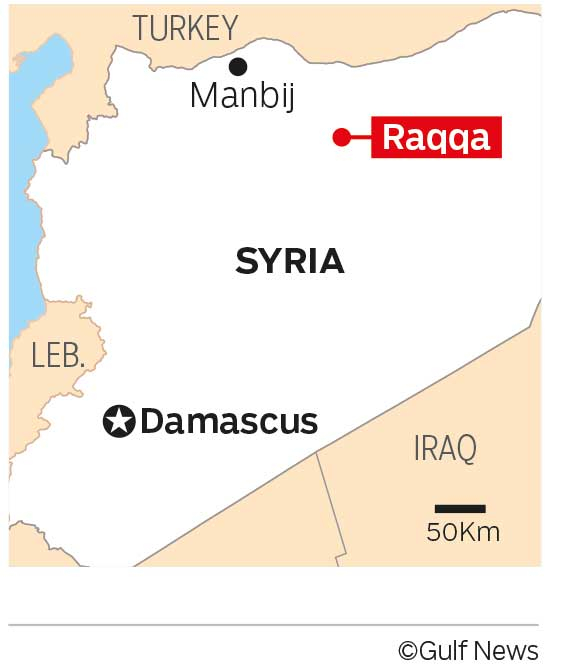Beirut: The international coalition battling Daesh will begin a final push on the militants’ Syrian stronghold Raqqa in the coming days, French Defence Minister Jean-Yves Le Drian said on Friday.
But on the ground, the US-backed Kurdish-Arab alliance spearheading the battle for the militant group’s de facto Syrian capital faces several key obstacles before reaching Raqqa.
Daesh has come under growing pressure from twin US-backed ground offensives targeting Raqqa and their other main stronghold, Mosul in Iraq.
“Today, we can say that Raqqa is surrounded and the battle will begin in the coming days,” Le Drian told France’s CNEWS television.
“This will be a very hard battle but essential.”
France, which has been targeted by a wave of militant attacks, is one of the most active members of the US-led coalition against Daesh.
It ratcheted up its air strikes against the extremists after the Paris massacre of November 2015 which was claimed by Daesh.
The militants are under attack from several directions in northern Syria, with Russia supporting its Syrian ally President Bashar Al Assad on one front and Turkey providing air cover for rebel groups battling the militants on another.
The US-backed Syrian Democratic Forces (SDF), a Kurdish-Arab alliance, has been working for months to encircle Raqqa.
The US military has provided air and artillery support involving Apache helicopter gunships to help the SDF in an offensive for the strategically important Tabqa Dam near Raqqa.
A US spokesman for the coalition said last week that seizing the dam would “give the SDF a strategic advantage and launching point needed for the liberation” of Raqqa.
“The first goal of the SDF is to control Tabqa city (next to the dam) or besiege it completely before starting the battle for Raqqa,” said Rami Abdul Rahman, director of the Syrian Observatory for Human Rights monitor.
The US has several hundred troops on the ground in Syria supporting the SDF forces.
But SDF fighters are still around eight kilometres from Raqqa at their closest point, to the northeast, but mostly stationed further away, between 18 and 29 kilometres from the city, according to the Observatory.
A US official said last week that up to 1,000 additional American troops could deploy to northern Syria under provisional plans drawn up by the Pentagon.
The plan, which still needs to be approved by President Donald Trump, would mark a significant uptick in US boots on the ground in Syria.
But a European diplomat, who did not want to be named, said the situation surrounding the Raqqa offensive remained “blurred”.
“The Americans are still in the review process. Trump did not make a decision (on who will take Raqqa), but it is clear that on the ground it is the SDF option that is developing.”
But there are “multiple alliances which make the situation very complex,” the diplomat added.
The anti-Daesh coalition estimates that between 3,000 and 4,000 terrorists are in Raqqa, a city of about 300,000.
Years of diplomatic efforts have failed to end the Syrian conflict, which has killed more than 320,000 people and displaced millions since it started in March 2011 with protests against Al Assad’s regime.
Talks going nowhere
The latest round of UN-backed Syria peace talks entered a second day in Geneva on Friday but there was little hope of a breakthrough in negotiations that have yielded little in previous rounds.
UN special envoy Staffan de Mistura was holding talks with the government and opposition delegations separately.
Deadlock remains over most of the toughest issues, notably Al Assad’s fate, with the opposition insisting he cede power and the government declaring the subject off limits.
Since Russia’s military intervention in support of Al Assad in 2015, the regime has gained the upper hand, retaking the former rebel bastion of Aleppo late last year.












